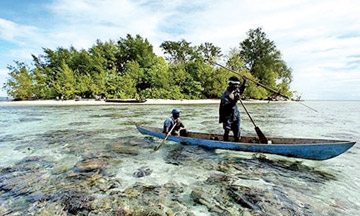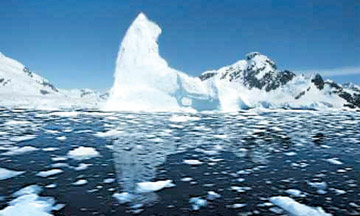Shrinking world due to global warming
By Dhaneshi YATAWARA
As the Intergovernmental Panel on Climate Change reports based on
their years of observation on the global climatic changes the earth is
losing 0.25 metres of its shorelines every year. This is as an impact of
the worldwide phenomenon of climate change or global warming.
 As man started using more and more fossil gas, oil and coal for the
advancement of their own species, today an irreversible threat - global
warming - is imposed on the entire planet. So far this is the only home
for humans and all other species. As man started using more and more fossil gas, oil and coal for the
advancement of their own species, today an irreversible threat - global
warming - is imposed on the entire planet. So far this is the only home
for humans and all other species.
The Earth is a blue planet - meaning major part of it is covered by
water. Thus, the impact on the ocean by global warming changes many
environments of the world, directly affecting several industries which
we humans heavily rely on. There are many impacts on ocean natural
resources from global warming.
Naturally, the surface temperature of the sea would be something
around 24C to 28C. So the first 100 to 200 metres it will be around this
range. But when you go deeper the temperature is like 3 degrees Celsius.
Following today's trend the global temperature is expected to reach
higher by 1.4 degrees to 5.8 degrees Celsius, according to scientists.
The sea level rises when the polar ice melts due to global warming.
In addition in the high tropical temperatures sea water expands, which
commonly happens to seas around our island. "When it comes to Sri Lanka
due to sea level rise we expect certain spots of the island will be
inundated and Islands in the Jaffna peninsula will be totally covered by
sea water," said Prof Ruchira Cumaranatunga of the Department of
Fisheries and Aquaculture of the Ruhunu University.
The Department of Fisheries and Aquaculture of the Faculty of
Fisheries and Marine Science Technology of the Ruhunu University
conducts a continuing research on impacts on Sri Lanka from climatic
changes due to global warming. Their observations have lead to a serious
situation for one of the country's main economies, fishing.
For our country these coastal areas are very crucial, especially for
the fishing industry, Prof. Cumaranatunga added. "The climate change
doesn't stop there; it also effects the wave patterns and could raise
storms," Prof. Cumaranatunga said, explaining the disasters that global
warming could create.
"In the sea, there is a level known as themocline. This is where the
temperature drops rapidly. The temperature drops from 22 Celsius to 5
degrees. With global warming this level goes deeper," she added. What is
the importance of this water level to fishing industry? According to
Prof. Cumaranatunga, this is where the fishermen catch most of the fish
harvest that includes the most popular fish for human consumption. "With
the temperature rise, tuna like fish tends to go deeper, making it
difficult to catch them. Even this may happen to bill fish commonly
known in Sri Lanka as 'Thalapath'," she added.
Tuna and bill fish are commonly found 100 - 200 metres deep sea
fishermen are aware of this and their techniques, be it old or new, are
based on these facts. When the fish goes deeper the fishermen can not
catch fish with the available knowledge.
"And in addition, as the temperature in the equatorial region goes
higher, the fish most probably will migrate to sub tropical regions.
Thus, the fishermen will not be able to find fish in their identified
locations and depths," according to the professor.
This is a phenomena where the fish harvest will be lowered
drastically affecting the fish industry and the community.
"Islands like ours will be largely affected with these climate
changes and not much damage to the large continents," she added. "Sri
Lanka is not a small island but of the middle level, yet we will also
suffer even though our contribution to global warming is negligible,"
she said.
 "Carbon dioxide dissolves in sea water and it makes the sea acidic.
The Ocean absorbed CO2 from a process that helped it maintain a stable
pH (8.179) which is not acidic. But as Carbon Dioxide continues to
dissolve in sea water and increase in acidity continues the shell
forming species, like crabs and lobsters will find it difficult to
develop their shells. Their lives are threatened," she explained. "Carbon dioxide dissolves in sea water and it makes the sea acidic.
The Ocean absorbed CO2 from a process that helped it maintain a stable
pH (8.179) which is not acidic. But as Carbon Dioxide continues to
dissolve in sea water and increase in acidity continues the shell
forming species, like crabs and lobsters will find it difficult to
develop their shells. Their lives are threatened," she explained.
Unprecedented levels of Carbon dioxide are released to the atmosphere
due to anthropogenic activities and this has lowered ocean surface pH
and made it more acidic. Studies have also shown that such high acidic
levels could cause reefs to fall apart.
"Not only do these marine species, but also the microscopic
crustaceans get affected.
Then what happens is that the food chain of many sea species gets
affected. There are important parts of the food chain. This is the food
for small fish and the plankton. Now gradually when these animals go
missing there will be cracks in the food chain. This results in the
upper levels of the food chain becoming starved," she said, explaining
the deterioration of fish species in the sea as a result of global
warming. Unless the big fish adopt to eat something else they will die
and dietary changes in animals is part of the evolution which takes
place over hundreds and thousands of years. As a result the
distribution, productivity, and species composition of global fish
production would change drastically. It will generate complex and
inter-related impacts on oceans, estuaries, coral reefs, mangroves and
sea grass beds that provide habitats and nursery areas for fish. Marine
living resources have a high economic value and their uses are numerous.
According to the Initial National Communication under the United
Nations Framework for Climate Change Conventions Sri Lanka will
experience sea level rises, high temperatures, more frequent and
prolonged droughts, high intensity of rainfalls and increased thunder
activity.
Above all, it will result in a significant threat to the coastal and
marine industry as well as to different sectors of the national economy
and human health.
|


